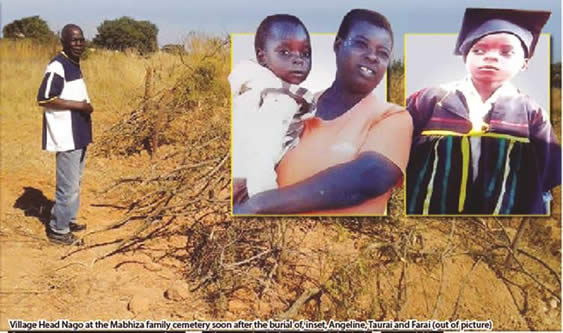Child killer: A troubled soul


Daisy Jeremani Gender Editor
SHE was a troubled soul who was failed by her community and family. Two earlier incidents in which she killed her babies should have raised warning flags to the community. Angeline Mabhiza, 32, from Nago Village 1, in Zimuto in Masvingo, made headlines recently after killing three children and later committing suicide. Mabhiza killed her children Taurai, 7, Farai, 2, and her cousin Leon, 6, after lacing their food with a pesticide.
She, together with Taurai and Leon, were found vomiting and frothing at the mouth by school boys who had gone to ask for water on their way home for lunch break. One of her children Thembinkosi, who is doing Grade 6 at a local school, escaped the gory death because unlike Taurai and Leon, she dismissed from school at 4PM.
Headman Nago said one of the children, Leon, whom he found alive when he was called by the alarmed boys, might have tried to escape, but had his legs tied with a rope.
“It’s a shame what happened here. This is a tranquil village. This was a gut wrenching and numbing experience, especially for me because the whole drama played out in my eyes,” he said.
When the boys who had gone to ask for water saw Mabhiza and the children frothing, they ran to the headman who lives just next to the home.
“I don’t know what could have gone into her head to do such a heinous act. I saw her twice the day she died, when she passed here with a friend going to water the garden.
“She looked fine, but who knows what goes on inside the head of a disturbed person? We always tell villagers of the importance of solving problems amicably,” he said.
Naume Chibade, wife to Chief Nemarundwi, said people were still in shock and even the Mabhiza family was still trying to come to terms with the tragedy.
“I have been there twice since the incident and I feel for her child that was left. I talked to her, she seems disturbed by the whole incident.
“When I visited, the child was saying she sometimes sees her late mother at the house. My prayer is that the young girl will not be haunted for life,” she said.
Mabhiza, who never married, had a history of killing children. She had killed two other babies before the recent poisoning that also took her life.
When a Chronicle news crew visited Angeline’s homestead, her mother, Nyunyuto Mabhiza, was away, though after the incident she vowed not to forgive Angeline. She acknowledged that there was something beyond the natural that made her daughter do what she did.
“I suspect that there is more than meets the eye. While I am not of the Mabhiza clan I urge them to consult traditional healers or prophets to find out what is it that was causing misfortunes because every year there is always a string of unexplained deaths,” she was quoted as saying.
The chairman of the Department of Sociology at the University of Zimbabwe, Professor Watch Ruparanganda, concurred saying as an anthropologist and sociologist he refers matters like these to the metaphysical, saying nothing can explain this incident other than the presence of mamhepo/imimoya.
The professor said the dearth of the extended family had seen a rise in all sorts of social ills because the idea that it takes a village to raise child has been eroded as individualism has been institutionalised.
“Due to colonisation which damaged our social structure, not only the nucleus, but as an extended theme group, now there are no mechanisms and people who can counsel relatives in despair.
“There are family spiritual issues that can only be fixed within a bigger group. In the days of yore, there were ways of solving issues to do with bad sprits, through appeasing vadzimu/amadlozi by the whole clan,” Professor Ruparanganda said.
He added that then, there were no jails, but strong social sanctions against bad behaviour that people were deterred. “People would be sat down by elders who would not admonish, but also try to appeal to that person’s human side,” the professor said.
That admonishing would make anyone embarrassed and therefore they would reform.
Chibade also decried the fact that the sense of community was gone and as such people now fear to intervene in domestic affairs of others.
This was also confirmed by Headman Nago who said he had on many occasions tried to help the family especially during the times when Angeline had committed infanticide but her mother would have none of it.
“Angeline’s history speaks for itself. She was a troubled soul who needed the understanding of the community and family. She was a volcano waiting to erupt – erupt she did, albeit with dire consequences,” she said.
Chibade, who also doubles up as a village health worker and church counsellor, said Angeline made bad choices from the start and her mother did not take kindly to her having children with four different fathers.
Due to all this pressure she might have found herself swimming in a sea of desperation, not knowing how to tread the water that swirled around her. Overwhelmed, she simply broke down.
“I think she viewed herself as having failed herself, her children and her mother. At village gatherings we talk about the need for us to live a life that is free from controversy, but not everyone listens.
“If one fails to meet these societal expectations they may experience excessive guilt, convince themselves that they are not worthy of help. No one is beyond redemption, even the Bible says that. Not only should Angeline have reached out for help, but the society should have also provided an ear,” said Chibade.
Reaching out she didn’t and three fresh graves at Mabhiza homestead are a constant reminder to Nago villagers that it’s noble to reach out to those on the precipice before they plunge over.










Comments